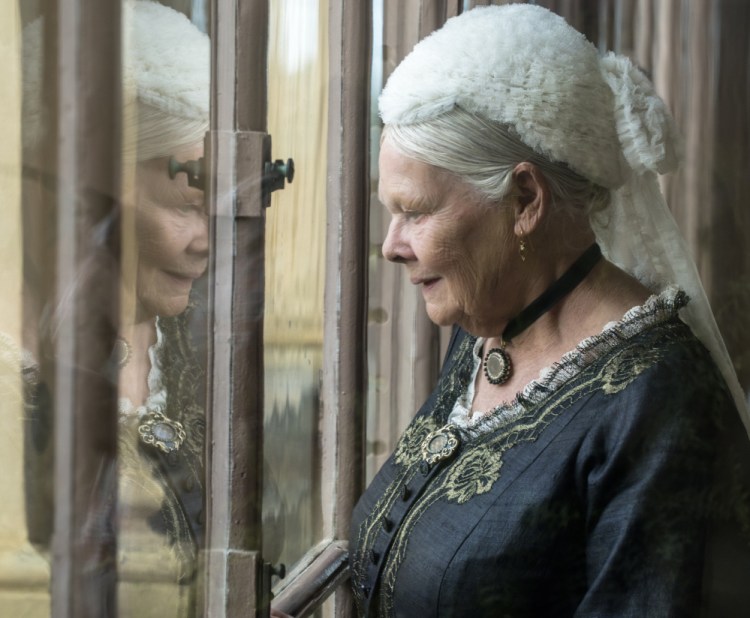Judi Dench’s memorable film roles range from 007’s steely boss M in multiple James Bond epics, an Oscar-winning eight-minute supporting turn as Queen Elizabeth I in “Shakespeare in Love” and a determined woman searching for the grown son she lost in infancy through a church-forced adoption in “Philomena.” Whether she’s performing with a twinkle in her eye, an involuntary break in conversation or a slight sob, she always conveys a combination of excitement and believability. At the 82, she’s the biggest female star in Britain.
Dame Dench – she was honored as Dame Commander of the Order of the British Empire in 1988 for her contribution to culture – seems fully at home in royal roles, middle-class roles or humble roles, but she can’t explain her chameleon-like ability to perform those colorful changes.
“I don’t know,” she laughed in a recent phone interview. “When it’s Cleopatra, you look at the story in front of you and try to make it as human as possible.” Royal parts aren’t something that British actresses specifically seek out. “I think it’s just a part that comes along, and if you’re lucky enough to be asked to do it, you try and do your best with it.”
Now, after winning a best actress Oscar nomination as the widowed, romantically inclined Queen Victoria in 1997’s factual “Mrs. Brown,” she returns to the role in another “mostly true” story. In “Victoria & Abdul,” she plays the queen in old age. An isolated and unhappy monarch, she finds renewed interest in life through Adbul Karim, a handsome, 24-year-old clerk from India (played by Bollywood star Ali Fazal) who through happenstance became her servant and best friend.
Playing Britain’s longest-reigning monarch at two very different phases of her life was relatively easy, she said.
“You’ve done the homework, because I did it 20 years ago. But this is a period of her life that I didn’t know about, and. therefore, it is in a way a continuance of her life, after her life with John Brown,” the subject of the first movie, a Scottish attendant with whom the queen had a scandalously warm personal relationship. “I haven’t seen it in connection with ‘Mrs. Brown,’ but I hope it adds up to the same person and a new aspect on her.”
The film gives an unconventional dry humor to Victoria, who is widely believed to have uttered the famous phrase “We are not amused” when a guest at Windsor Castle told a risqué story. That made revisiting the role especially appealing because “only by humor can you possibly really tell someone a serious story. Humor is essential to everyday living. Humor makes her somehow more accessible. I’m sure it was there. ‘We are not amused?’ I don’t think it was quite so.”
The queen’s generation-spanning connection to her exotic servant comes “because of curiosity. She has a great fire in her, and she obviously feels very strongly about things and speaks her mind.”
The film focuses on the affection shared by the title characters, but it also is a critical commentary on Britain’s colonial past and, implicitly, its current immigration issues.
Telling an important topic from a tender, personal side “is very timely,” she said. “What’s extraordinary is that the nationality and the difference is secondary in the story. This might have happened whatever nationality he might have been. It just happened, and the moment is so pertinent. She is so curious and wants to inquire, wants to have somebody who will teach her. To have someone she can relax with and learn” about a far-off culture.
“Surely that’s the most important thing we can possibly learn.”
While British audiences are fascinated with aristocracy, Dench doesn’t feel that it comes out of a longing for the old days of empire.
“I don’t think anyone is nostalgic for that. They are fascinated by the royal family just to see what dedication they have to the job,” she said. “I think it’s only admirable what they do, and I can understand that people are captivated. I always think of it when I go into town and go around Buckingham Palace. Any time, there’s always crowds of people there to look. It’s extraordinary.”
Though Dench is practically royalty in the film industry, she doesn’t tell directors to hold their tongues and go away.
“I’m the most unsure person of everybody,” she said. “In the theater, when you’ve rehearsed six weeks for something, then the director leaves. That’s my most miserable moment. The director walks away and the child is left to walk on its own. No, no, no. I need constant help and I’m always asking questions.
“I remember John Logan, who wrote ‘Skyfall,’ also wrote a play I did called ‘Peter and Alice.’ He was in on a rehearsal one day, and I, with every line practically, stopped and asked the director questions. ‘Tell me about this and tell me about that and what does this mean?’ So John suddenly turned and said, ‘Now you know why I killed you off in ‘Skyfall.'”
Send questions/comments to the editors.



Success. Please wait for the page to reload. If the page does not reload within 5 seconds, please refresh the page.
Enter your email and password to access comments.
Hi, to comment on stories you must . This profile is in addition to your subscription and website login.
Already have a commenting profile? .
Invalid username/password.
Please check your email to confirm and complete your registration.
Only subscribers are eligible to post comments. Please subscribe or login first for digital access. Here’s why.
Use the form below to reset your password. When you've submitted your account email, we will send an email with a reset code.